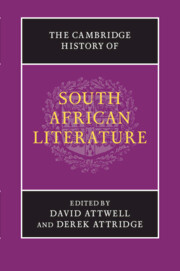Book contents
- Frontmatter
- Introduction
- PART I ORATURES, ORAL HISTORIES, ORIGINS
- PART II EXPLORATION, EARLY MODERNITY AND ENLIGHTENMENT AT THE CAPE, 1488–1820
- PART III EMPIRE, RESISTANCE AND NATIONAL BEGINNINGS, 1820–1910
- PART IV MODERNISM AND TRANSNATIONAL CULTURE, 1910–1948
- PART V APARTHEID AND ITS AFTERMATH, 1948 TO THE PRESENT
- 19 The fabulous fifties: short fiction in English
- 20 Writing in exile
- 21 Afrikaans literature, 1948–1976
- 22 Afrikaans literature after 1976: resistances and repositionings
- 23 The liberal tradition in fiction
- 24 Black Consciousness poetry: writing against apartheid
- 25 Popular forms and the United Democratic Front
- 26 Writing the prison
- 27 Theatre: regulation, resistance and recovery
- 28 The lyric poem during and after apartheid
- 29 Writing and publishing in African languages since 1948
- 30 Writing the interregnum: literature and the demise of apartheid
- 31 Rewriting the nation
- 32 Writing the city after apartheid
- PART VI SOUTH AFRICAN LITERATURE: CONTINUITIES AND CONTRASTS
- Index
- References
25 - Popular forms and the United Democratic Front
from PART V - APARTHEID AND ITS AFTERMATH, 1948 TO THE PRESENT
Published online by Cambridge University Press: 28 January 2012
- Frontmatter
- Introduction
- PART I ORATURES, ORAL HISTORIES, ORIGINS
- PART II EXPLORATION, EARLY MODERNITY AND ENLIGHTENMENT AT THE CAPE, 1488–1820
- PART III EMPIRE, RESISTANCE AND NATIONAL BEGINNINGS, 1820–1910
- PART IV MODERNISM AND TRANSNATIONAL CULTURE, 1910–1948
- PART V APARTHEID AND ITS AFTERMATH, 1948 TO THE PRESENT
- 19 The fabulous fifties: short fiction in English
- 20 Writing in exile
- 21 Afrikaans literature, 1948–1976
- 22 Afrikaans literature after 1976: resistances and repositionings
- 23 The liberal tradition in fiction
- 24 Black Consciousness poetry: writing against apartheid
- 25 Popular forms and the United Democratic Front
- 26 Writing the prison
- 27 Theatre: regulation, resistance and recovery
- 28 The lyric poem during and after apartheid
- 29 Writing and publishing in African languages since 1948
- 30 Writing the interregnum: literature and the demise of apartheid
- 31 Rewriting the nation
- 32 Writing the city after apartheid
- PART VI SOUTH AFRICAN LITERATURE: CONTINUITIES AND CONTRASTS
- Index
- References
Summary
‘Protest art’ – political art – ‘struggle poetry’
The 1960s witnessed a massive clampdown by the government on protest writing (and black writing in general – see Horn, ‘Right of the People’), resulting in authors being silenced and driven into exile. In the year 1963, the South African government introduced the Publications Act, ‘an extensive and repressive “security” apparatus [that was] levelled against literary production’ (Ryan, ‘Literary-Intellectual Behavior’, p. 293), which wiped out the writing of many important South African writers (see Kunene, ‘Ideas under Arrest’). And when black literature revived in the following decade, it looked quite different. As it was based now on the concepts of Black Consciousness, white literary orientations were no less denounced than the political values of whites: in fact, this new generation of blacks conceived of the western literary conceptions as an integral part of western imperialism.
In September 1968, Ophir: Journal for Poetry published one of the first poems of Oswald Mtshali (‘The Master of the House’, p. 7), followed by ‘What's in this Black “Shit”’ by Wally Mongane Serote (p. 16) in 1969, while Ophir issue 11 featured seven poems by Pascal [Mafika] Gwala (‘Kwela Ride’, ‘Things’, ‘Promise’, ‘An Attempt at Communication’, ‘Food for the Couple’, ‘Election Pincers’, ‘When it's all Double-You’). By the time Ophir published its last issue, in spring 1976, black poetry in English had again become a force no longer to be overlooked. When Staffrider was launched in 1978, there was a chorus of black voices in poetry.
- Type
- Chapter
- Information
- The Cambridge History of South African Literature , pp. 523 - 544Publisher: Cambridge University PressPrint publication year: 2012
References
- 1
- Cited by



